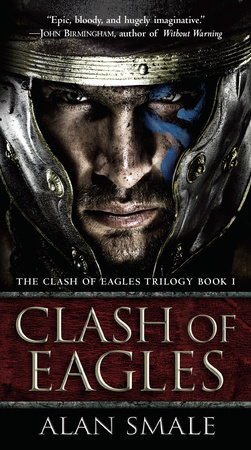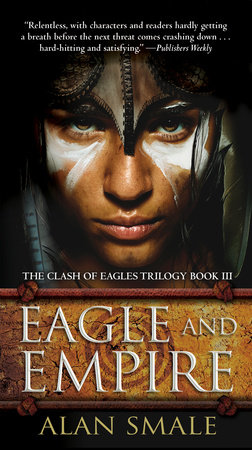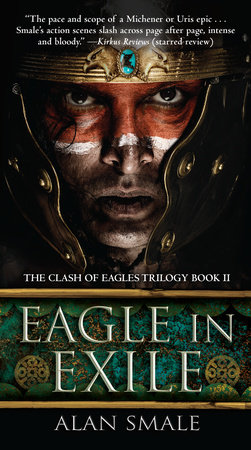Excerpt
Clash of Eagles
Chapter I
Gaius Publius Marcellinus galloped his horse along the marching line of his Sixth Cohort, racing toward the site where two of his men had been slain by skulking Iroqua warriors.
Trumpets blared, steel armor clanked, and leather creaked, but the footfalls of his legionaries made little sound in the torn-up soil. The corps of engineers that went ahead of the 33rd Legion carved a road through the Hesperian forest barely wide enough for ten men to march abreast. The skies were heavy with cloud, and this late in the afternoon there was no singing and little talking in the ranks. In front of Marcellinus stretched a column of men three miles long. Behind him, the Seventh and Eighth Cohorts would extend back at least another two miles, guarding the two hundred supply wagons that groaned in the Legion’s wake.
First Centurion Pollius Scapax awaited Marcellinus on the path, pointing into the trees. Marcellinus slid off his horse and peered into the undergrowth. “In there?”
“Two men dead,” Scapax said tersely. “Half a dozen grieving. Thirty or so standing guard.”
“Tullius?” The Tribune of the Sixth.
Scapax shrugged. “Not here yet.”
Marcellinus barely hesitated. His adjutants were far forward with the First Cohort, but if he couldn’t trust Pollius Scapax, he couldn’t trust anyone. He strode off the path, between the oaks, and into a small gap in the trees hardly wide enough to be honored with the name of a clearing.
One of the dead legionaries rested against an oak, an Iroqua arrow in his shoulder and a short spear buried deep in his gut. The other had been clubbed to the ground, arms broken and legs splayed, his throat slashed open. Both men had been scalped, their foreheads and hair hacked away roughly, leaving shocking bloody gashes in their place.
Torn bushes and trampled grass gave evidence of a short, sharp struggle. The soldiers’ weapons and armor were gone, presumably stolen by their murderers.
The dead men were both fresh-faced and callow; neither could have been more than eighteen years old.
At least it was obvious how they had died. Other legionaries had been found with ferocious wounds ripped into their flesh or—maybe even more terrifying—barely a mark on them at all.
Six men knelt in grief by the corpses, bare-headed, presumably the tent mates of the dead. “Helmets on, soldiers,” said Marcellinus. “Let’s not lose anyone else here.”
They gaped up at him, incredulous. One man thrust his helmet back onto his head with bad grace. The rest ignored the command, their faces a mixture of pain and insolence. Marcellinus chose not to notice. The days of unquestioning obedience were far behind them now.
Three contubernia—twenty-four men in all—faced outward to secure the clearing, heavy spears at the ready. Their eyes scoured the thickets. The men looked nervous, and with good reason. The dead legionaries’ wounds were fresh, and the alarm had been sounded recently. Whoever had done this could still be hiding in the brush nearby.
Not twenty feet behind them the behemoth of the 33rd Legion still marched grimly through the eternal forest.
Marcellinus looked again at the mourning soldiers. He was intruding on their pain, and nothing he could say or do would ease it. “Just a few moments longer,” he said to Scapax. “Then everyone goes back to the column.” The men on guard looked relieved.
Scapax cleared his throat. “Burial detail, sir?”
Marcellinus looked again into the underbrush that surrounded them. Pale light filtered through the trees. The last thing he wanted was to have his men exposed any longer than they had to be. But the Seventh Cohort, with the baggage train, must be only minutes away.
“Their choice,” he said. “They can wait by the column, put the bodies onto one of the wagons, and bury them tonight, or say their good-byes now and be done.”
The centurion saluted. As Marcellinus turned to leave the glade, the trumpets sounded again, one far to the west followed by another just a few hundred feet away, a complicated sequence of notes.
It was a message from Corbulo, his First Tribune. Marcellinus was needed at the head of his Legion. Another obstacle, and clearly something their engineers could not tackle easily.
Marcellinus’s shoulders and back ached from riding. Worse was the low throb of tiredness behind his eyes. Pulling himself wearily back into the saddle, he drummed his heels against his horse’s flanks.
As he rode forward, the Legion was already slowing to a halt.
Pollius Scapax’s voice boomed out across the sloping hillside. “First Cohort, stand to! Eyes up, spears out!”
The men of the First fell into battle formation, three ranks in close order. Tired soldiers set the hafts of their heavy pila in the ground and held them angled outward. Archers stood with bows strung and quivers of arrows at their feet, blinking owlishly at the shallow valley. The evening breeze ruffled the crests on their steel helmets.
No enemy was in sight, but men had died today, and this was hostile territory. The First was mustered to repel any potential attacks while the slaves and the soldiers of the other cohorts made camp.
The castra was a roving town that re-created itself daily in its own image. They rebuilt it identically every afternoon, occupied it for one night only, then abandoned it the next morning: civilization on the march through Nova Hesperia.
The engineers had chosen a site only a couple of miles past the Legion’s sudden stop. As usual it was a large open area near a river, on rising ground, with little nearby cover that could be exploited by attackers. Even before the First and Second had arrived, the engineer corps had measured and marked with a knotted rope where the streets would be laid out. Now, the meadow became a hive of activity. Up went the ramparts, earthworks six feet high around the perimeter surrounded by a deep defensive ditch. Down came any trees unfortunate enough to be within the square, their wood pressed into use to construct the raised guard platforms at each corner and above the four gates. Up went the tents, down went the latrines. Finally, up would go the five temples obligatory for feeding the Legion’s faiths: the Mithraic temple, the shrines to Cybele and Sol Invictus, the open-air altar and prayer rail of the Christ-Risen, and the small but rather forbidding statue of Jupiter Imperator, which had more presence than any of the real-life Imperators Marcellinus had served.
The camp was square, with streets constructed on a grid. Its alignment was as constant as its arrangement, with the wide main street called the Cardo aligned north-south so that the evening and morning light shone down the long cross streets named for the cohorts and centuries that lived on them. The rank and file lived eight men to a tent, and Marcellinus’s own Praetorium tent formed the center of the camp. Latrines, the field hospital, stables, the smithy, and the armory were arrayed around the rim with open areas at the corners for the slaves.
As always, Marcellinus walked the streets as the camp took shape, receiving reports from his tribunes and centurions. The air reeked of stale sweat and fresh wood and rang with shouted orders, banging and sawing, and curses in a broad range of dialects.
“Two more soldiers down,” said First Tribune Lucius Domitius Corbulo moodily, joining him at the Eastgate.
Beside them legionaries and auxiliaries shoveled earth with resolve, digging the deep ditch and throwing the soil up to where their colleagues were shaping the ramparts. The soldiers knew they were being watched by their commanding officers as well as their centurion, and their faces gleamed with sweat. At the crest of the ridge of earth, other men set and bound the sharpened stakes that formed the palisade.
Marcellinus stepped aside to let a line of a dozen slaves pass, sweating and weighted down by the bags of grain they carried in from the wagons. “Two more.”
“Were they good men?”
“They’re all good men,” said Marcellinus. “Legionaries, not auxiliaries, if that’s what you’re asking. Young.”
“Do we know what happened?”
“Saw a deer and went after it, most likely. Fresh meat is hard to come by.”
Corbulo nodded, acknowledging the convenient lie. “Of course.”
Deer rarely approached a marching column. Much more likely that one of them had been caught short by his stomach and had left the column to relieve himself, guarded by his friend, and both had died for it.
Better for a soldier to die in battle, or hunting, than squatting behind a bush.
“Either way, it has to stop,” said Corbulo. “Stupid deaths like these?”
Marcellinus glanced sideways. His First Tribune was veering perilously close to insubordination. “The centurions have their orders. We can’t be more clear. Nobody leaves the column, ever. Nobody lets down their guard for a moment.” He shook his head in frustration and set off to walk north along the intervallum inside the still-growing rampart. After a pause, Corbulo followed in his wake.
The 33rd Legion had begun to leak men as if from a slow wound soon after they’d broken camp and marched away from the Mare Chesapica. Now, four weeks inland, they were down fifty-eight soldiers, this out of a legion in which their so-called centuries had been only seventy men strong to begin with.
They had cleared villages and taken slaves but had yet to be engaged by the enemy in a real fight. Their losses were due solely to harassing actions: the lone arrow flying out of the trees, the blade from behind, and more often than not, the unexplained disappearance. It was hard enough to march into an empty continent on the wrong side of a giant ocean, blaze a trail, tramp twenty miles along it each day, and then build a marching camp the size of a small town every night without having to risk being picked off by cowardly savages whenever a few twigs’ worth of cover separated you from your comrades.
And, since Marcellinus’s cohorts were rounded out with the superstitious denizens of Roman provinces from Aethiopia to Scythia, Magyar to Hispania, and back around, the night camp was always alive with rumors. Man-bears were hiding behind trees; huge hawks were swooping in from the air to pick off the valiant Roman infantry one by one. Giant rodents burrowed up from beneath them. It seemed that in the wilderness of a foot soldier’s imagination no animal was allowed to be normally proportioned. Superstition was strong at the best of times in a rabble like that, and the farther away from Urbs Roma he took them, the worse they got.
Marcellinus shook his head. Nobody in his right mind could feel comfortable with two months of ocean separating him from the Imperium. But however far afield his duties took him, he wasn’t about to start believing in giant hawks.
That left the natives. They were everywhere; on the fleet’s arrival the shores of the bay had been crowded with villages of cringing fishermen. Many had fled. Others were now roped to the heavy carts that made up the Legion’s supply train.
Now, though, they’d left behind the fisherfolk and the berry pickers. The villages they passed might be empty, but the woods around them were not. Hiding behind the tree trunks of inland Nova Hesperia was a different breed of native altogether.
Marcellinus turned. “Where have you put our prisoner?”
“Should be in your tent by now.” Corbulo cocked an eye at him. “I thought you might want her undamaged.”
“Very considerate of you,” said Marcellinus, straight-faced. “You have a heart after all.”
“If I do, this country will be the destruction of it.”
“Aren’t we supposed to march over all obstacles in our path?” If Corbulo could needle him about the deaths, the least Marcellinus could do in return was chide his tribune for letting the whole Legion come to an ignominious halt.
“I was at the rear of the First at the time, consulting with Gnaeus Fabius,” said Corbulo, and then, seeing Marcellinus’s frown, grudgingly drew himself up a little straighter. “Yes, sir . . . It shouldn’t have happened. I take responsibility. And I’ll talk to Scapax about it.”
“Scapax was back with me, at the . . . with the Sixth.”
“That would be part of the problem, then.” Corbulo grinned wryly. “But stopping like that? The First Cohort? I’m surprised they didn’t break into a run, straight at her.”
“So am I,” said Marcellinus. “So am I.”
Corbulo glanced past Marcellinus, grimacing. “Ah. Here comes our Britannic ray of sunshine.”
Aelfric, Tribune of the Fourth and Fifth Cohorts, gruff and mustachioed, was walking down a lane toward them. He had shed his armor, but retained the padded jerkin that went between that armor and his tunic, and the scarf that prevented chafing at the neck. Unlike the other legionaries he wore braccae, the woolen breeches of his countrymen. The overall effect was unflattering. Corbulo sniffed.
Aelfric eyed Corbulo with trepidation but addressed Marcellinus directly. “West rampart is up and ready for your inspection, sir. And most of my lot are tents up and set for the evening.” He looked leftward at the northern ramparts, where the Second and Third were still toiling, and grinned at Corbulo. “Your fellows need a hand, do they?”
“Hardly,” said Corbulo, frost in his tone. “They just do a proper job.”
“Oooh,” said Aelfric. “Is that a fact? And what do mine do, then?”
“Gentlemen,” said Marcellinus.
Corbulo raised a sardonic eyebrow. Certainly he himself was a patrician, a Roman citizen of the Imperium. The Briton could never be.
Dropping the matter, Aelfric looked at the skies. The wind was picking up, the tents flapping behind him. “Might rain in a bit.” To Marcellinus he said, “Want me to stop by the Sixth? See if Tully needs anything? He’s probably got his hands full, what with the burials and morale and all.”
“I’m sure he can’t wait to see you,” said Corbulo. “Well, sir, my centurions will be expecting me. Enjoy your interrogation.”
“Interrogation?” said Aelfric.
“Up with the news as always,” said Corbulo, and with a curt nod to Marcellinus he strode forward to heap invective on a soldier of the Second who had stopped to lollygag with his shovel mate.
Aelfric watched Corbulo go. “He seems out of sorts. What did you do to him?”
“Two more dead,” said Marcellinus.
“I hadn’t forgotten,” said the Briton. “But they weren’t his men.”
“Shouldn’t matter. Either way, it’s my fault.” Marcellinus was their Praetor. As Corbulo had just made very clear, it was his job to stop things like this from happening.
“If you say so. But at least it’s a slow bloodletting. At this rate we’ll have time to walk twice around the world before they get us all.”






